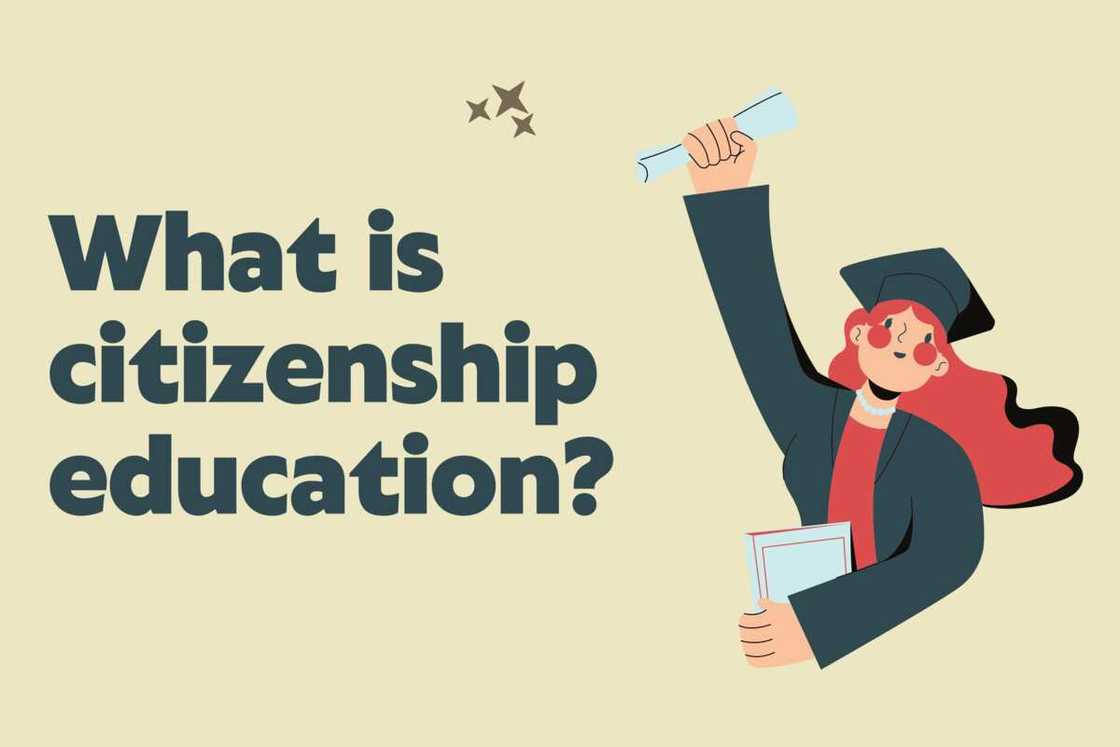What is citizenship education? Definition, types, importance
Citizenship education in Nigeria is an important and efficient way that contributes to the participation of citizens in democratic and also development processes in our country. This phenomenon helps citizens express their opinions individually and within a group.

Source: UGC
Citizenship participation is based on the defence of individual and collective rights. It also ensures the realisation of the obligations of each citizen. It is generally accepted that civil education consists of three elements: a civil position, civil knowledge and civic skills.
Introduction to citizenship education
What is citizenship education in Nigeria? Active citizenship education is the teaching of effective participation in the processes of democratic development both at the local and state level; its goal is to teach a person to live in freedom.
The importance of civic education in community development is that it helps ensure effective civic participation. This is an important aspect of strengthening the ability of society to manage its affairs.
PAY ATTENTION: Join Legit.ng Telegram channel! Never miss important updates!
When defining citizenship education, it is majorly based on the values and principles of transparency, participation, active response, accountability, empowerment and justice. Integral components of civic education are the means of communication and access to information.
For Nigerian students, citizenship education means:
- Development of their confidence and motivation to participate in public life.
- They assume roles, use their rights and perform duties usually related to citizenship in democratic systems.
- When exercising their rights and duties, they show openness, tolerance and responsibility.
- This element covers certain aspects. These are valuable and educational elements—forming certain value orientations conditions the first aspect. And the second one ensures the formation of personal qualities.
What are the two types of citizenship education?
Students may be encouraged to think critically, join volunteer organisations, and be informed of their democratic rights and obligations as part of citizenship education.

Source: UGC
What are examples of citizenship education? Below are some types of citizenship education.
- Classroom-based learning: Through this procedure, students learn about the duties and rights of citizens in a democracy.
- Community-based education: This kind of education takes place outside a typical community school setting. Students of various ages and socioeconomic backgrounds may participate. It frequently entails carrying out community service tasks alongside nearby organisations.
What is the importance of citizenship education to Nigerian students?
In Nigeria, citizenship education involves educating children about the many national institutions and teaching them that the rule of law governs social interactions and human relationships. Additionally, it involves educating the youngster about the importance of actively engaging in the nation's political process.
Why is citizenship education important? Below are some of the importance of citizenship education to students.
- It enables youngsters to recognise their rights and call for government accountability.
- It gives young people political education that will enable them to participate in democratic processes.
- Produce young people in Nigeria who are responsible, informed, and independent.
- Assist citizens in identifying national issues and suggesting remedies.
- It enables young people to comprehend community values, which are crucial for the development of society.
- Teach young people strong moral values essential for the nation's development.
- Develop in young people a sense of national consciousness and patriotism for their communities and the nation.
- Give the young people the knowledge and abilities they need to participate actively in society.
Goals of citizenship education
In Nigeria, the main goal of civic education is to teach a citizen the minimum necessary knowledge about the mechanism of democracy.

Source: UGC
This citizen should also be convinced of the values and advantages of democratic life and has the qualities of an independent, critical-minded person. The other goals of citizenship education are:
- Common good: One of the fundamental principles of citizenship education is the obligation to contribute to the common good. The concept of the common good means that the political community has some values. These values and interests are significant for all members of the community.
- Freedom: It's one of the strongest human desires. Having freedom, a person implements plans and makes an independent choice of life goals and ways to achieve them.
- Equality: Political equality is understood as equality of opportunity to achieve goals. The result of political aspirations will still be different depending on individual abilities and inclinations. Social equality speaks of the absence of classes and privileges in society.
- Truth: Citizens need to know what is happening in the state they create. They have the right to demand from officials an account of their activities, their money spent, and decisions are taken.
- Political knowledge: It helps to understand the functioning mechanism of modern democracy.
- Rights to knowledge. It gives an idea of the fundamentals of the constitutional system and the rights and freedoms specified in the constitution.
- Sociological knowledge: Students can understand the structure of society, its norms and values, and social development problems. It also allows us to understand our place in society, the complexities of social relations, family, education, culture, age and gender differentiation.
- Historical knowledge: Knowledge of history helps to understand the present and plan the future.
Citizenship education has a very important goal, to educate a responsible and critically thinking person. The students should be ready to communicate with other people and participate effectively in the affairs of the state.
READ ALSO: What are the 10 major political problems in Nigeria today?
Legit.ng recently published an article outlining the top ten significant political issues facing Nigeria today. There are numerous issues in the political and social spheres.
Every day, minor improvements are done to better the lives of Nigerians. Unfortunately, the diversity of Nigerian politics is not always beneficial because each politician has different ideas on how to rehabilitate the country.
Source: Legit.ng






